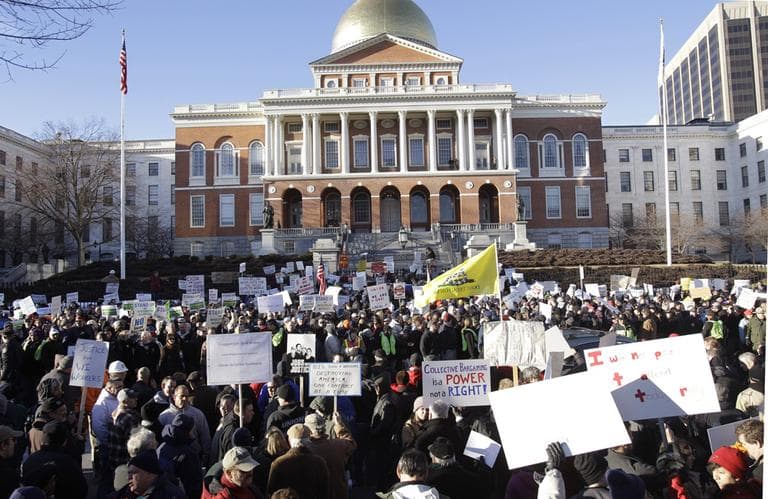Advertisement
Mass. Unions Ramp Up Lobbying Spending In 2011

Massachusetts unions are on pace to break state records for spending on lobbying, as they try to protect their jobs and flex their collective bargaining muscles in a political environment that's grown increasingly skeptical about organized labor.
Unions are on track to spend 60 percent more than last year and triple what they spent fives years ago.
More than three dozen unions spent a total of $2.6 million lobbying Beacon Hill lawmakers during the first six months of 2011, well ahead of the $1.9 million they spent during the same time period in 2010.
That puts the unions on track to spend 60 percent more than last year and triple what they spent on lobbying just five years ago, according to an Associated Press review of state lobbying records.
The review found unions are on pace to spend about $5.3 million in all of 2011. Unions spent about $3.3 million on lobbying last year.
Just five years ago in 2006, union spent about $1.6 million on lobbying. Since then, lobbying totals have climbed steadily, according to the AP review.
The Big Spenders
Some of the biggest spenders are public employee unions. Topping the list is the Massachusetts Teachers Association.
In the first six months of the year, the union spent $893,000 on lobbying, just a few thousand dollars shy of what they spent during all of 2010. The union is also on pace to easily top the record $1.3 million they spent in 2009.
Most of the lobbying dollars the MTA spent this year have gone to pay the salaries of dozens of lobbyists. Other expenses included postage, utilities, printing, rent and consulting and legal fees.
A spokesman for the MTA declined comment.
Collective Bargaining Rights And Health Care Under Scrutiny
Union backers say the increased spending is justified. They say dwindling state and municipal revenues are threatening core union principles, such as collective bargaining rights and health care coverage.
"As our economic crisis continues, there is more and more of an effort to scapegoat public employees and put more of the burden to balance budgets on their backs," said James Durkin, a lobbyist for AFSCME Council 93.
The union - which represents 45,000 state, county and municipal employees in Massachusetts, Maine, New Hampshire and Vermont - reported nearly $177,000 in lobbying expenses in Massachusetts during the first half of 2010.
"What you're seeing is a trend that's not unique to Massachusetts. It's something that is taking place in virtually every state in the country."
James Durkin, lobbyist for AFSCME Council 93
"What you're seeing is a trend that's not unique to Massachusetts," Durkin said. "It's something that is taking place in virtually every state in the country."
Massachusetts has so far avoided clashes like those sparked earlier this year during Wisconsin Republican Gov. Scott Walker's epic battle with public employee unions. But there have been local skirmishes between state officials and unions in recent years.
One was the fight to eliminate the so-called "Quinn Bill," which rewards police for obtaining higher education degrees. Others were Gov. Deval Patrick's initiative to put civilian flaggers at some construction sites to replace paid police details and an ongoing debate about how best to overhaul the state pension system.
The efforts to end the Quinn Bill and to allow for civilian flaggers were opposed by the state's police unions.
One of the biggest battles came this year over municipal health care plans for public workers. After a bruising legislative fight, and sometimes heated union rhetoric, Patrick last month signed a municipal health care overhaul giving cities and towns more flexibility to make changes to public employee health insurance plans outside of collective bargaining.
"There's no question that in the past few years that the issue of public pensions and group health insurance for public employees have been front and center," said Bill Rehrey, of the Retired State, County & Municipal Employees Association of Massachusetts.
That union spent nearly $302,000 in the first six months of the year on lobbyist salaries and other expenses.
Unions Remain A Force On Beacon Hill
Rep. Brad Jones, the top ranking Republican in the Massachusetts House, said unions, particularly those representing public workers, remain a force on Beacon Hill.
"It's certainly fair to say that the presence of public employee unions have increased" at the Statehouse, Jones said. "There's certainly more activity than 20 years ago, or 10 years ago or even five years ago."
Jones said lawmakers must walk a fine line between listening to the legitimate concerns of unions and reflexively agreeing with every union demand.
"I think it still comes down to legislators saying, 'Come by and share what your viewpoints are,' and pushing back whenever they need to," said the North Reading lawmaker. "Some members are more willing and more able to do that than others."
Union officials say lobbying isn't focused only on traditional collective bargaining fights.
They said it can also mean pushing bills to improve working conditions, such as pending legislation that would require the Department of Youth Services to report serious assaults to district attorneys.
The push follows a series of recent assaults on staff by youths.
This program aired on August 20, 2011. The audio for this program is not available.